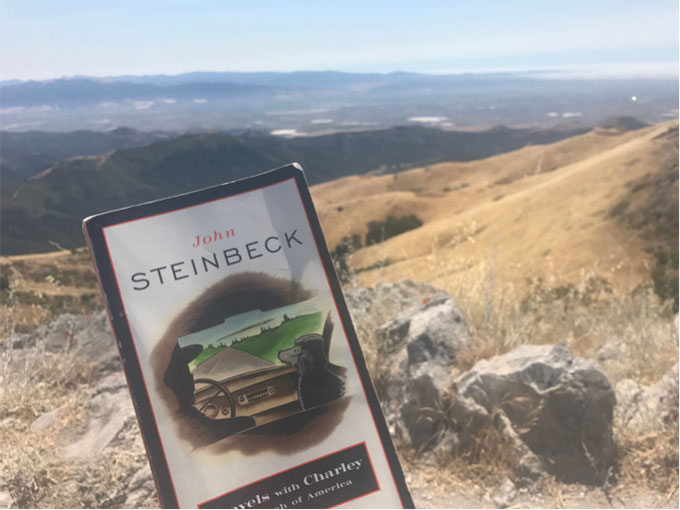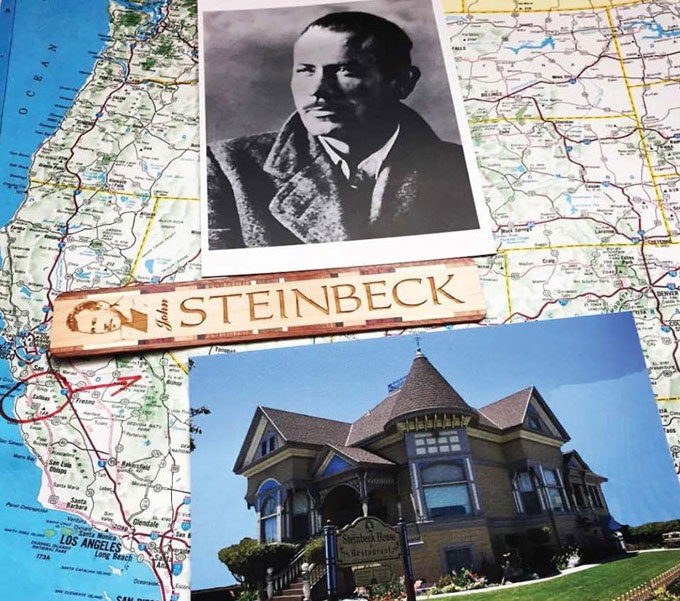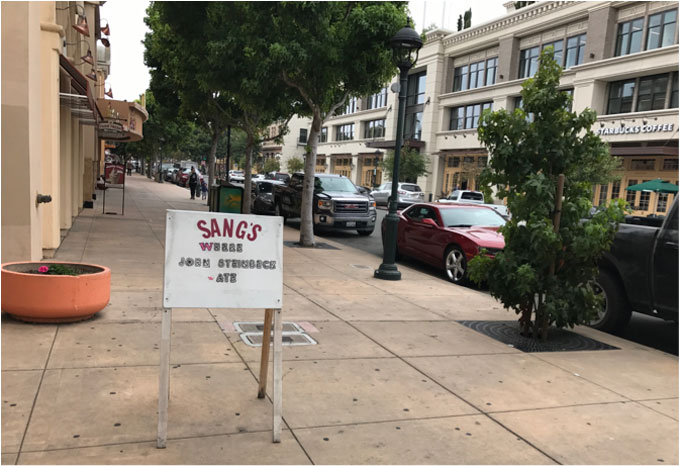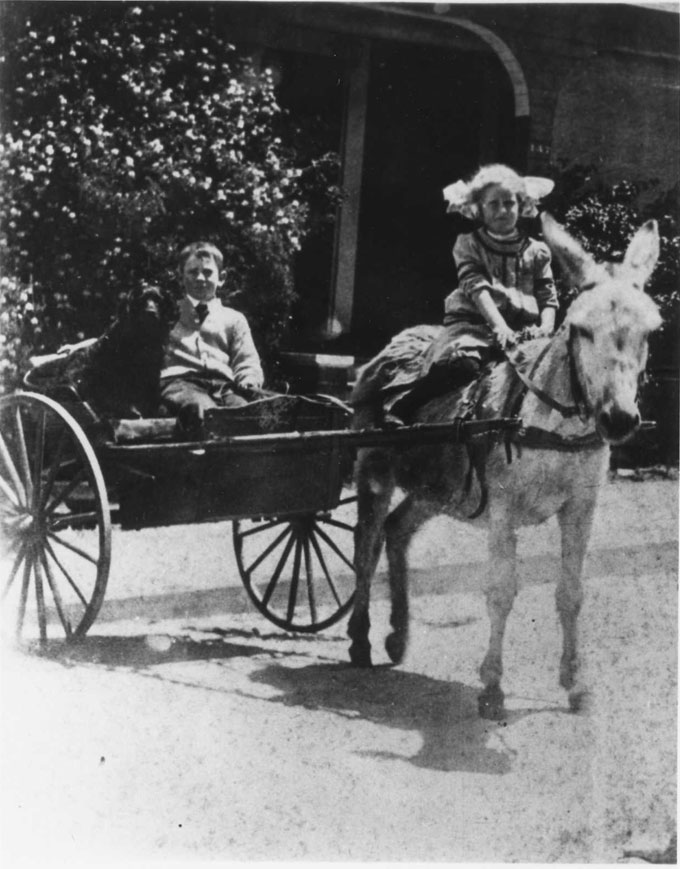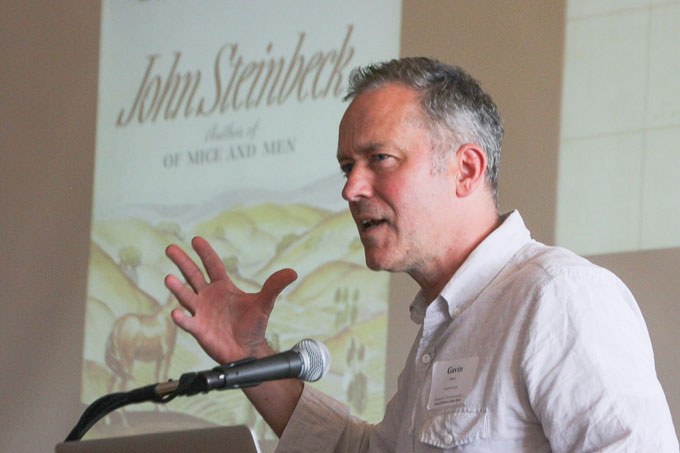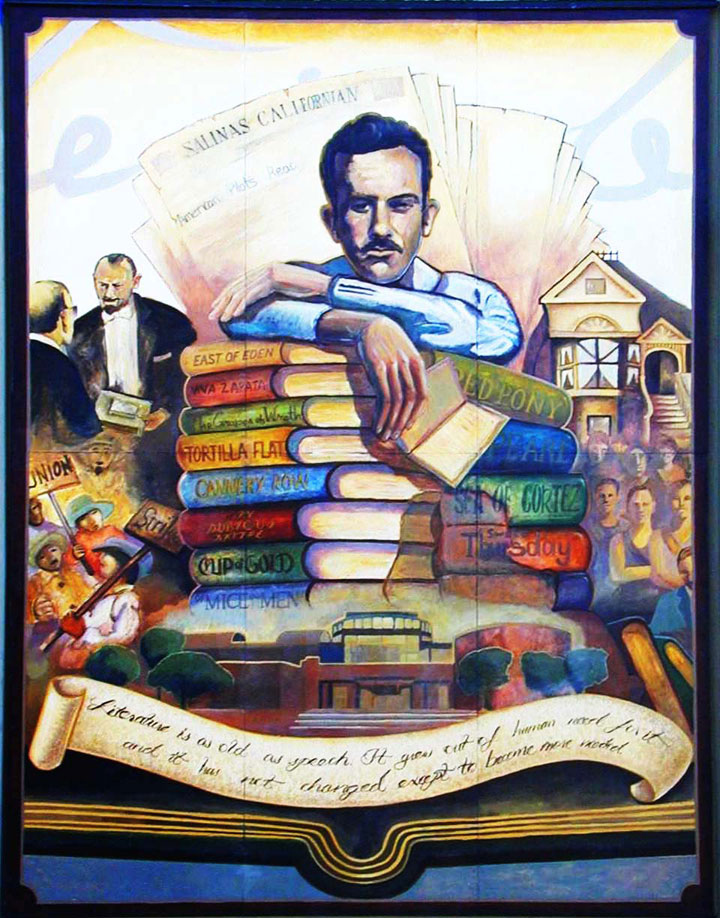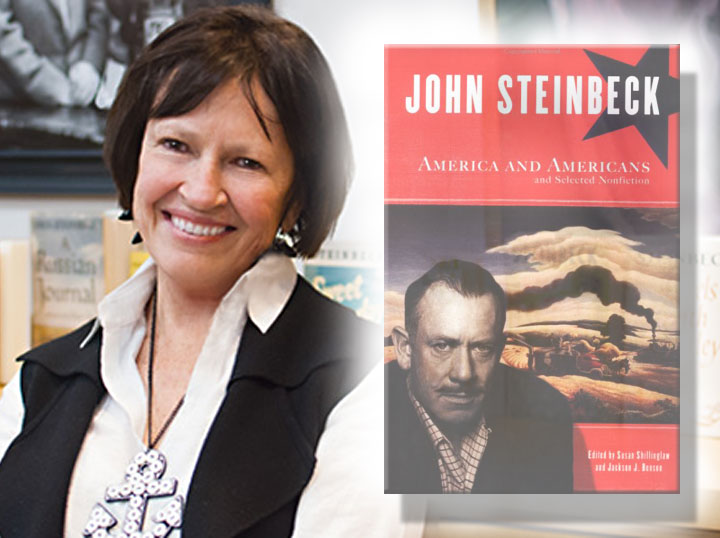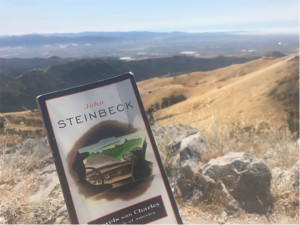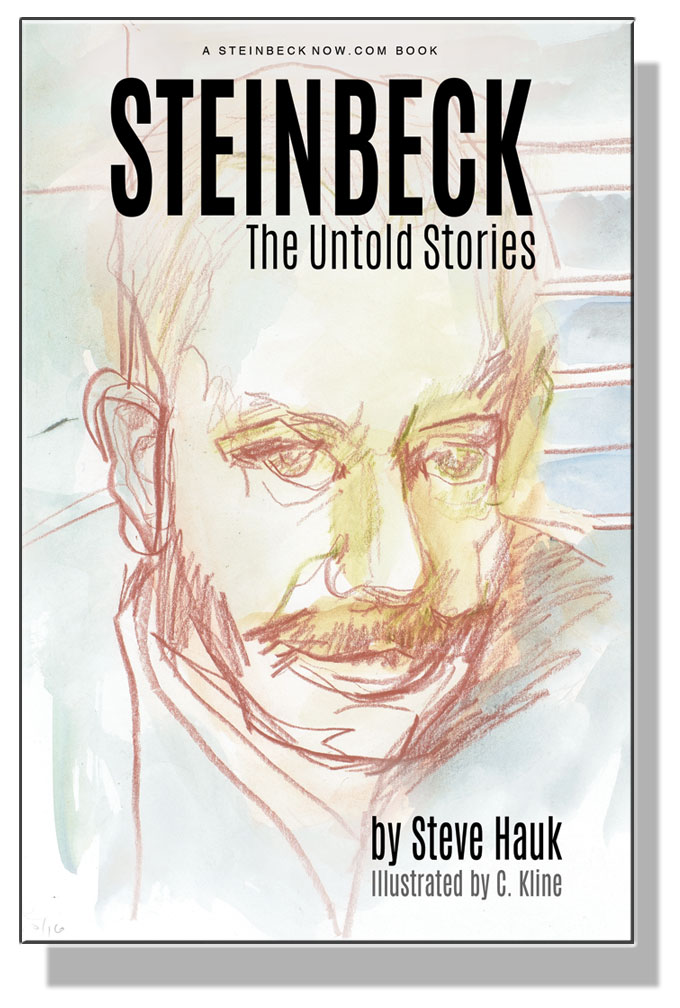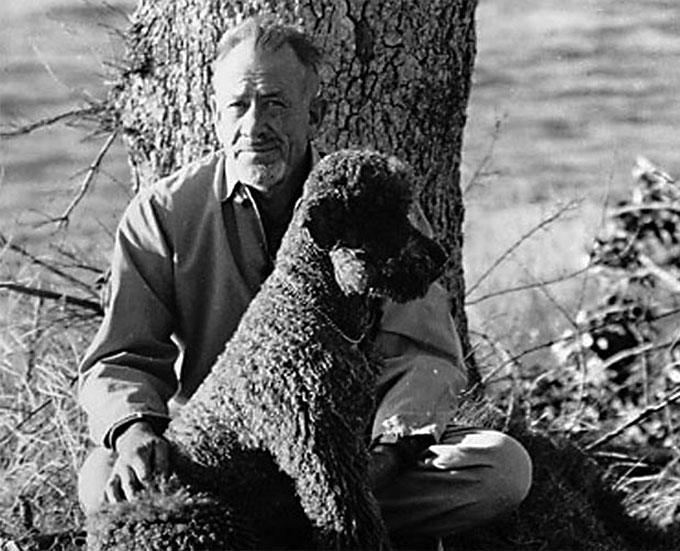J.S., older, at his writing desk in his New York City apartment. Corduroy sport coat, plaid shirt open at the collar. Several pads of lined yellow paper and unopened letters on his desk. A hallway stage left, the front door to the apartment stage right. In the back wall, but not behind him, a window looking out onto the dark, some illumination from city lights. It is late night.
A bookcase close by. On top, a tape recorder, lighting making it slightly more noticeable. He snubs out a cigarette, looks at recorder. He clicks it on, clears his throat, changes his mind, clicks it off.
He is tense. Picks up a letter, puts it down. Turns and stares at window. Stands, goes to it, looks out. Paces, return to desk, opens a letter. Leans forward, reads to himself.
Hears a sound from outside the door, starts, gets up, goes to door, listens, tries knob to make sure it is locked, returns to desk, sits, opens desk drawer, pulls out a revolver. Checks if it is loaded, sets it on the desk. Picks it up again, checks it again, smiles at his fear, returns it to desk top, facing the barrel toward the door.
Picks yellow tablet, looks at something he has written, takes a pencil, adds a word or two, scratches one out, clears his throat, reads from it:
J.S.: “He felt it intensely, in the tainted land, in houses, in small towns and . . .”
Looks at tape recorder, considers, switches it on, a slight whirring sound.
J.S. (Looks at tablet, clears his throat, reads again, to the tape recorder): He felt it intensely, in the tainted land, in houses, in small towns and large cities, on plains and rolling hills, a kind of evil –
A Man’s Voice (Interrupting): John, who’re you talking to . . . ?
He starts, looks up from his tablet. The Gaunt Man is standing downstage, half in and out of the light, in overalls, chewing on a toothpick.
J.S.: Tom!
Gaunt Man (Laughs): First time I ever scared you!
J.S.: Nah, you didn’t scare me.
Gaunt Man: You sure ‘n hell jumped! (Grins) Something you wrote – scare yourself?
J.S. (Smiles): I’ve done that.
Gaunt Man: Damn good writer who can scare himself.
J.S. (Furtively covering the revolver with a yellow pad): Well, I admit you surprised me, Tom – it’s been a while since your last visit.
Gaunt Man: You were doing okay there for a time – didn’t think you needed me.
J.S.: Don’t take this wrong, Tom, but don’t think I do now.
Gaunt Man: Course you do or I wouldn’t be here – you called for me.
J.S.: You always say that . . .
Gaunt Man: Cause it’s true. (Chews on toothpick, shakes his head) Beats me why anyone’d question those gone before them! . . . Like an infant questioning how her mama shells peas. Makes no sense. The infant hasn’t shelled a pea – and you haven’t been where I’ve been. (A beat) What’s that there?
J.S. (Thinking initially he means the revolver, puts his hand over pad): What’s what?
Gaunt Man (Pointing at the tape recorder): That – that thing goin’ round?
J.S. (Relieved): Oh, that’s called a tape recorder. I didn’t have it last time you visited?
Gaunt Man: I’d sure remember something goin’ round like that . . . does it do anything else?
J.S.: Copies your voice . . . when you play it back, you hear what you just said.
Gaunt Man: If you just said it, what’s the point?
J.S.: Well . . .
Gaunt Man: Why not just get a parrot?
J.S.: I got a talking myna bird, Tom, why would I want a parrot?
Gaunt Man (Looking around): Thought it was quiet in here. Where is he – where’s John L?
J.S. (Fingers to lips): In the bedroom, snoozing. Don’t get him started. John L kibitzes, I kibitz back, nothing gets done.
Gaunt Man: Keeping Elaine up?
J.S. (A beat, bordering on a mumble): Elaine’s gone a few days.
Gaunt Man (Pause): So that’s what you were doing when I came in, copying your voice?
J.S.: Well . . .
Gaunt Man: Tell me about it.
J.S.: It’s like a Dictaphone machine, Tom – you ever hear of those?
Gaunt Man (Nodding): Sure, like a parrot.
J.S. (Nettled): But you don’t have to be as close to be recorded, so it’s different. This thing can hear you clear across the room.
Gaunt Man: So can a parrot. This something new in the world?
J.S.: Been around a while, but now a little more affordable . . .
Gaunt Man: Even for Okies?
J.S.: Not back then. But the Okies today – if they can afford a radio, they can probably afford one of these.
Gaunt Man (Staring at it): Yeah, sure, but is it a waste of money?
J.S.: Not sure yet . . . still trying it out.
Gaunt Man: To do what?
J.S.: I read the words I’ve written into this, to see how they sound.
Gaunt Man: That’s what you were doing when I came in?
J.S.: Starting to . . .
Gaunt Man: That so important, how the words sound? Do your readers read your books out loud? Isn’t that for children’s books?
J.S. (Irritably): Listen, Tom –
Gaunt Man: I don’t get it, that’s all.
J.S.: It’s a rhythm thing . . . probably more than a sound thing.
Gaunt Man (Skeptical): Uh, okay . . . and what’s the excuse for the gun under your yellow writing pad . . . or do you think I missed that clever move of yours?
J.S.: That, Tom, is none of your business.
Gaunt Man: Come on – you wanted me to see it, so talk about it.
J.S. (Stands, paces): I didn’t want you to see it, and I don’t want to talk about it.
Gaunt Man: You sure about that?
J.S. (Felt): I’m clumsy, that’s all. Always have been, you know that. (Suddenly morose): Sorry, Tom, just tired . . . taking it out on you.
Gaunt Man (Curious, cocking his head): Tired? You are the one man I know never gets tired. What makes you tired now?
J.S.: Riling people, I guess.
Gaunt Man: Hell, John, riling people’s what makes you tick.
J.S.: Well then, I’m tired of people I riled threatening me and mine.
Gaunt Man: That happen?
J.S.: All my life, from the California days on.
Gaunt Man (Pause): Recently too?
J.S. (A beat): Sure . . .
Gaunt Man (Pushing): When?
J.S.: . . . few days ago. . .
Gaunt Man: That’s why the gun?
J.S.: Had guns before, after those cowboys came after me – about the time you were coming into being, Tom.
Gaunt Man (Gently): I know that story alright, you told me enough times – they kill you, no me, no Tom. We settled that . . . Now tell me about this one.
J.S.: Not much to tell – guy calls – soft voice – says don’t be thinking you’re safe just because you’re three thousand miles away. I’m coming for you.
Gaunt Man: Maybe a bill collector?
J.S. (Laughs): Could be.
Gaunt Man: Anything more this guy says?
J.S.: The usual – calls me a Commie. (Smiles ruefully) Well, J. Edgar would agree with him.
Gaunt Man: Hoover?
J.S.: Yeah.
Gaunt Man: Then what – about the call, I mean.
J.S.: Nothing more . . . he hangs up – softly.
Gaunt Man (A beat): Call’s from California?
J.S.: Three thousand miles . . . so works out . . . unless . . .
Gaunt Man: Unless?
J.S.: Unless he’s already here . . . the distance remark making me think I’ve got some time . . . be clever of him.
Gaunt Man (The gun): Why you have this ready to go?
J.S.: Be a fool not to, Tom.
Gaunt Man (Studies him, chews on toothpick): You get lots of threats, why this one bother you?
J.S.: The softness of the voice . . . something about it . . . reminded me when I was a kid and a soft wind blew up the valley, rustling the leaves outside my house . . . (Goes to window, looks out, pause) . . . in the afternoons, day after day. . . I told you before . . . don’t know why, but that scared me as a boy in Salinas . . . still does . . . this voice had that quality . . . like the soft wind through the trees . . . and then . . . well . . . (Change of mood, shrugs his shoulders) . . . well, kind of a funny thing now . . .
Gaunt Man: Funny?
J.S.: Hoover’s men tailing me been driving me crazy lately – but since that call, I’m glad they are . . . doing me a favor – when I’m followed like this afternoon, and see it’s one of Hoover’s boys, I breathe easier . . . (Smiles) Hoover’d have a fit if he thought he was doing me a favor . . .
They are quiet a moment as he looks out window meditatively. The Gaunt Man shifts his weight restlessly.
Gaunt Man: Watching you now? . . .
J.S. (As he moves away from window, back to desk): Across the boulevard . . . government’s renting a hotel room . . . a suite, probably.
Gaunt Man (Still skeptical): Watching you through that window?
J.S.: Yep.
Gaunt Man: John, you been drinking? (Goes to window, hand in an overall pocket, casually looks out, chewing on his toothpick) Can’t see nothin’ . . . just a big building . . .
J.S.: That’s a hotel. They’re there, Tom.
Gaunt Man: You sure?
J.S.: Third floor, fourth window from the left.
Gaunt Man: You seem pretty cool for a man being investigated by the Federal Bureau of Investigation.
J.S.: They’ve investigated me since the Thirties.
Gaunt Man: Get anything on you?
J.S.: Not much.
Gaunt Man (Looks out again): You think they’re lookin’ at me now?
J.S. (A beat): Better question is, can they see you?
Gaunt Man: You mean `cause I’m what some people call a apparition?
J.S.: That’s what I’m wondering.
Gaunt Man: Maybe I should wave . . . (Looking again) What floor you say?
J.S.: Third floor, fourth window from the left . . . almost straight across . . . should be dark so you can’t see them.
Gaunt Man (Looking): I’ll wave . . . (Does so, lazily, waits, turns back) And if they saw me? . . .
J.S.: Immediate report to J. Edgar – “Boss, the writer’s hanging out with a Commie in overalls.” Hoover’d say, “That figures,” might even laugh . . .
Gaunt Man: But you’re glad they’re watching you now . . .
J.S.: Someone kills me in this room, maybe they’ll see it, get the bastard . . . more important, get my body out of here before Elaine returns. (A beat) Hoover long ago . . . my California days . . . we go way back, you know . . . both of us young . . . sent me a typewritten note, unsigned, but I knew it was from him . . . wrote there were people wanted me dead . . . told me to be wary of strangers, maybe even some people I knew . . .
Gaunt Man: You take that as a threat?
J.S.: A warning – he wanted me for himself, wanted to be the one to get me to crack. I sent a return note thanking him, signed my name, never got a reply – think he was embarrassed he might have done something nice.
Gaunt Man: All this why Elaine’s gone? For your woman’s safety?
J.S. (Nodding): Sent her off for a while.
A Voice (From off, plaintiff tone): Elaine! Elaine!
They both look toward hallway.
J.S.: We woke him.
Gaunt Man: Bring him out?
J.S.: I don’t want him here . . . in case . . .
Gaunt Man: The man with the soft voice?
J.S.: Be the same as a child seeing it . . . animals know about death . . . maybe he’d kill John L too . . . sounded like someone who’d find pleasure doing something like that . . .
A Voice (Pleadingly): John! Elaine! John!
Gaunt Man (Pause, gesturing toward John L’s voice): Well?
J.S. (Pause): Not yet – I want him to get used to us not being around, not at his beck and call.
Gaunt Man: You goin’ somewhere?
J.S.: We’re flying to Europe soon, maybe after I’ll push on to Vietnam. (Pause, softer) John L doesn’t know it, but he’s leaving us . . . going to Hollywood, has a new home waiting with Fred, a movie man . . . makes damn good movies, Fred does.
J.S. looks off, then moves tablet, almost absently picks up the revolver, studies it.
Gaunt Man (Waits, then): How it feel?
J.S. (Noncommittal): Okay . . .
Gaunt Man: Colt automatic?
J.S.: Got two, one for here, the other (Pats his chest) for carry.
Gaunt Man: Licensed?
J.S.: (Nodding): Wasn’t easy . . .
Gaunt Man: Character witnesses?
J.S.: Needed four . . . had to scramble . . . Some friends backed off . . . that hurt some . . .
Gaunt Man: . . . should have expected . . .
J.S. (Nodding): I did . . . hurt anyway, you know? . . . One signed without hesitation – John L’s vet’ in Nyack, man named Morris Segal . . . said he likes the way I treat animals, doesn’t give a damn about my politics . . .
A Voice: John L’s hungry! John L’s hungry!
J.S: (Calling): Be there soon, John L . . . (A beat) Likes celery and bananas, John L does . . . and a thick piece of wheat bread spread with butter. (Pause) You know, Tom, the Irish have this belief if there’s a bird in your home the day after you die, your soul flies free . . .
The Gaunt Man turns away, looks off, with his hands in his overall pockets, chews restlessly on his toothpick.
J.S.: . . . they say a wild bird . . . but not many birds given the chance won’t take flight . . . why we clip their feathers and keep them in cages . . . denying them freedom.
Gaunt Man (Trying to sound offhand, but tense): Tell you, John, freedom hasn’t done much for me – I’m free but I killed a man and can’t forget it . . .
J.S.: Tom . . .? Tom, I wrote that.
Gaunt Man (Turns back to face him): You wrote it, but it happened to me.
J.S.: Needed to do it . . . you had to suffer . . . thought you understood, thought we talked all this out long ago . . .
Gaunt Man: Talkin’ don’t make it go away. Sometimes I try imaginin’ that man – what he done to make me so angry . . .
J.S. (Pause): You bump into him out there?
Gaunt Man: Not yet . . . but keep an eye.
J.S.: You think he’d want revenge?
Gaunt Man: We’re beyond revenge out there but not above letting the other know. I keep an eye for cops, too, you havin’ me say wherever a cop was beating up a field worker and, well, the rest of that stuff, that I’d be there . . . don’t see me or anyone else lasting long sayin’ stuff like that . . .
J.S.: Don’t forget, Tom, I made you resourceful.
Gaunt Man: Yeah, maybe . . .
J.S. (Pause, studies him): . . . and gave you ideals . . .
Gaunt Man: I guess . . .
J.S. (Conceding): I’m sorry, Tom . . .
Gaunt Man (Nods acceptance, chews on toothpick, looks away, pause): It’s okay . . . I’m tired, that’s all . . . so takin’ it out on you, I guess.
J.S. looks at him with a kind of sorrow. There is a silence, then:
The Voice: John L’s lonely! John L’s lonely!
J.S. turns away, goes to window, looks out.
J.S.: John L realizes we’re coming to the end . . . Elaine, him, me . . . (Pause) . . . would have liked him here the day after I die . . .
Gaunt Man (Looking toward door): He might be, you’re not careful.
J.S.: I named him after John L. Lewis . . . champion of the working man . . . not unlike you, Tom. (Looking out window, trying to lighten the mood) You can bet an agent’s dialing Hoover right now – “Hey, boss, no reason to worry about that writer anymore – he’s talking to himself again.” And Hoover says, “Imbecile, those are just the kind we need to worry about – the crazy ones.”
Gaunt Man tries to smile, can’t. They are silent a moment, awkward with each other for the first time. Footsteps heard. Then silence. They look toward door.
J.S.(Pause): You’d better go . . . just in case . . .
Gaunt Man: You sure?
J.S.: You being here would destroy something . . . some kind of balance we shouldn’t fool with . . .
The Gaunt Man takes a few steps back, gesturing toward the window.
Gaunt Man: Use your head – shoot straight and keep the lights on and the blinds up . . . (Indicating tape recorder) . . . and that parrot machine goin’ round . . . might prove handy somehow . . .
J.S: So maybe it’s good for something after all?
Gaunt Man: Maybe . . . (With a sudden cock of his head) You think it’s hearing me . . . hearing what I’m saying?
J.S. (Looking over at it, same curious attitude): I don’t know, Tom.
The Gaunt Man disappears into the darkness.
Gaunt Man’s Voice (Trailing off): . . . hearing my voice . . .
J.S. waits a moment, then approaches his desk.
The Voice: John L is lonely! John L is hungry!
J.S. (Sotto voce): I’m coming, John L. I’m coming with celery and a banana – maybe even a nice piece of wheat bread.
J.S. looks at the tape recorder. Sets the revolver on the desk pointing toward the door. He puts the recorder on rewind. The sound is intense. He waits, nervous, an eye on the door. The recorder lurches to a stop. The door is tried. J.S. flips the recorder on play, without looking picks up the gun and holds it ready.
The Tape Recorder (After a few seconds of silence): “He felt it intensely, in the tainted land, in houses, in small towns and large cities, on plains and rolling hills, a kind of evil – “
Gaunt Man’s Voice (Interrupting): “John, who’re you talking to . . .?”
Blackout.


